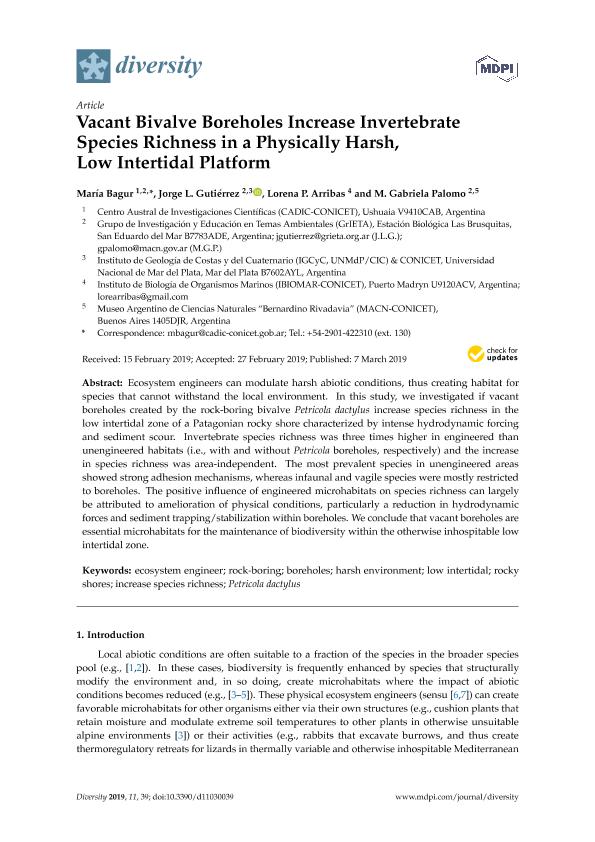Artículo
Vacant bivalve boreholes increase invertebrate species richness in a physically harsh, low intertidal platform
Fecha de publicación:
03/2019
Editorial:
Multidisciplinary Digital Publishing Institute
Revista:
Diversity
ISSN:
1424-2818
Idioma:
Inglés
Tipo de recurso:
Artículo publicado
Clasificación temática:
Resumen
Ecosystem engineers can modulate harsh abiotic conditions, thus creating habitat for species that cannot withstand the local environment. In this study, we investigated if vacant boreholes created by the rock-boring bivalve Petricola dactylus increase species richness in the low intertidal zone of a Patagonian rocky shore characterized by intense hydrodynamic forcing and sediment scour. Invertebrate species richness was three times higher in engineered than unengineered habitats (i.e., with and without Petricola boreholes, respectively) and the increase in species richness was area-independent. The most prevalent species in unengineered areas showed strong adhesion mechanisms, whereas infaunal and vagile species were mostly restricted to boreholes. The positive influence of engineered microhabitats on species richness can largely be attributed to amelioration of physical conditions, particularly a reduction in hydrodynamic forces and sediment trapping/stabilization within boreholes. We conclude that vacant boreholes are essential microhabitats for the maintenance of biodiversity within the otherwise inhospitable low intertidal zone.
Archivos asociados
Licencia
Identificadores
Colecciones
Articulos(CCT - MAR DEL PLATA)
Articulos de CTRO.CIENTIFICO TECNOL.CONICET - MAR DEL PLATA
Articulos de CTRO.CIENTIFICO TECNOL.CONICET - MAR DEL PLATA
Citación
Bagur, María; Gutiérrez, Jorge; Arribas, Lorena Pilar; Palomo, Maria Gabriela; Vacant bivalve boreholes increase invertebrate species richness in a physically harsh, low intertidal platform; Multidisciplinary Digital Publishing Institute; Diversity; 11; 3; 3-2019; 1-12
Compartir
Altmétricas




